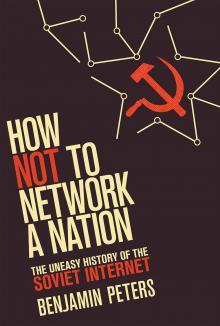Kaslov reviewed How Not to Network a Nation by Benjamin Peters
That was unexpected
4 stars
In "How not to network a nation" Benjamin Peters covers all of the attempts to network the USSR spanning a period of over 30 years, of which project OGAS lasted the longest. In the early 50s inspired by the American SAGE computer system and the Norbert Wiener s Cybernetics the Madness began.
First in the early 50s, cybernetics had to be rehabilitated from their capitalist tendencies (whatever that was supposed to mean) after Stalin s death. Next their approach to the idea of networks was quite different:
To oversimplify, Baran foresaw a national state network simulating a brain without a body, while Glushkov (and Beer) anticipated a network nation simulating a body with a brain—a government in touch with its people.
Also because of this difference the project became much larger than anything the Americans had planned. Americans way of thinking was to just connect their military and scientific computers …
In "How not to network a nation" Benjamin Peters covers all of the attempts to network the USSR spanning a period of over 30 years, of which project OGAS lasted the longest. In the early 50s inspired by the American SAGE computer system and the Norbert Wiener s Cybernetics the Madness began.
First in the early 50s, cybernetics had to be rehabilitated from their capitalist tendencies (whatever that was supposed to mean) after Stalin s death. Next their approach to the idea of networks was quite different:
To oversimplify, Baran foresaw a national state network simulating a brain without a body, while Glushkov (and Beer) anticipated a network nation simulating a body with a brain—a government in touch with its people.
Also because of this difference the project became much larger than anything the Americans had planned. Americans way of thinking was to just connect their military and scientific computers and then figure out what to do with it, while the Soviets intended to use the network to take over their command economy.
Now, just because cybernetics were rehabilitated, that didn't mean that they were free of other ideological hurdles:
Fedorenko and Glushkov felt they had no other choice: they had to align their technical national architecture with the political system architecture.
Meaning to even suggest that in order to get anything done you had to go side vise and zigzag through the hierarchy would make them politically poisonous to them selves and others.
Followed by factory managers and middle managers distrust of the project, fearing that they might become obsolete, and not to mention entire ministries not wanting this system for them selves for they might get obsolete but also not wanting to surrender it to anyone else for fears that the ministry that takes it over might become more influential then themselves.
And the final nail in the coffin, they had interest but no direct support from the Kremlin to tell the military to stop hoarding their technology and share:
The biggest advantage that the United States wielded over the USSR appears to have less to do with the market independence of private commerce than the porousness of research, resources and knowledge flows between military and civilian projects.
This was a fascinating and enlightening read with a very fitting title, but I am afraid its academic style might put off most people.

